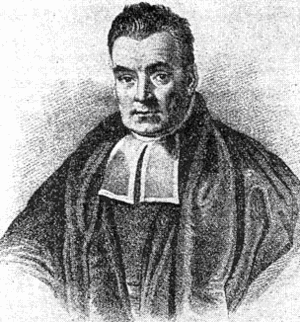Thomas Bayes (nonfiction): Difference between revisions
(Created page with "thumb|Thomas Bayes.'''Thomas Bayes''' (/ˈbeɪz/; c. 1701 – 7 April 1761) was an English statistician, philosopher, and Presbyterian minister who i...") |
No edit summary |
||
| (4 intermediate revisions by the same user not shown) | |||
| Line 1: | Line 1: | ||
[[File:Thomas_Bayes.gif|thumb|Thomas Bayes.]]'''Thomas Bayes''' (/ˈbeɪz/; c. 1701 – 7 April 1761) was an English statistician, philosopher, and Presbyterian minister who is known for having formulated a specific case of the theorem that bears his name: Bayes' theorem. Bayes never published what would eventually become his most famous accomplishment; his notes were edited and published after his death by [[Richard Price (nonfiction)|Richard Price]]. | [[File:Thomas_Bayes.gif|thumb|Thomas Bayes.]]'''Thomas Bayes''' (/ˈbeɪz/; c. 1701 – 7 April 1761) was an English statistician, philosopher, and Presbyterian minister who is known for having formulated a specific case of the theorem that bears his name: [[Bayes' theorem (nonfiction)|Bayes' theorem]]. Bayes never published what would eventually become his most famous accomplishment; his notes were edited and published after his death by [[Richard Price (nonfiction)|Richard Price]]. | ||
He is known to have published two works in his lifetime, one theological and one mathematical: | He is known to have published two works in his lifetime, one theological and one mathematical: | ||
| Line 6: | Line 6: | ||
* ''An Introduction to the Doctrine of Fluxions, and a Defence of the Mathematicians Against the Objections of the Author of The Analyst'' (published anonymously in 1736), in which he defended the logical foundation of [[Isaac Newton (nonfiction)|Isaac Newton]]'s calculus ("fluxions") against the criticism of [[George Berkeley (nonfiction)|George Berkeley]], author of The Analyst. | * ''An Introduction to the Doctrine of Fluxions, and a Defence of the Mathematicians Against the Objections of the Author of The Analyst'' (published anonymously in 1736), in which he defended the logical foundation of [[Isaac Newton (nonfiction)|Isaac Newton]]'s calculus ("fluxions") against the criticism of [[George Berkeley (nonfiction)|George Berkeley]], author of The Analyst. | ||
It is speculated that Bayes was elected as a Fellow of the Royal Society in 1742 on the strength of the | It is speculated that Bayes was elected as a Fellow of the Royal Society in 1742 on the strength of the ''Introduction to the Doctrine of Fluxions'', as he is not known to have published any other mathematical works during his lifetime. | ||
In his later years he took a deep interest in probability. Professor Stephen Stigler, historian of statistical science, thinks that Bayes became interested in the subject while reviewing a work written in 1755 by [[Thomas Simpson (nonfiction)|Thomas Simpson]], but George Alfred Barnard thinks he learned mathematics and probability from a book by [[Abraham de Moivre (nonfiction)|Abraham de Moivre]]. Others speculate he was motivated to rebut David Hume's anti-Christian An Enquiry Concerning Human Understanding. | In his later years he took a deep interest in probability. Professor Stephen Stigler, historian of statistical science, thinks that Bayes became interested in the subject while reviewing a work written in 1755 by [[Thomas Simpson (nonfiction)|Thomas Simpson]], but George Alfred Barnard thinks he learned mathematics and probability from a book by [[Abraham de Moivre (nonfiction)|Abraham de Moivre]]. Others speculate he was motivated to rebut David Hume's anti-Christian An Enquiry Concerning Human Understanding. | ||
| Line 18: | Line 18: | ||
== Fiction cross-reference == | == Fiction cross-reference == | ||
* [[Crimes against mathematical constants]] | |||
* [[Gnomon algorithm]] | |||
* [[Gnomon Chronicles]] | |||
* [[Mathematician]] | |||
* [[Mathematics]] | |||
== Nonfiction cross-reference == | == Nonfiction cross-reference == | ||
* [[Bayes' theorem (nonfiction)]] | |||
* [[Mathematics (nonfiction)]] | * [[Mathematics (nonfiction)]] | ||
External links | == External links == | ||
* [https://en.wikipedia.org/wiki/Thomas_Bayes Thomas Bayes] @ Wikipedia | * [https://en.wikipedia.org/wiki/Thomas_Bayes Thomas Bayes] @ Wikipedia | ||
[[Category:Nonfiction (nonfiction)]] | [[Category:Nonfiction (nonfiction)]] | ||
| Line 33: | Line 38: | ||
[[Category:People (nonfiction)]] | [[Category:People (nonfiction)]] | ||
[[Category:Philosophers (nonfiction)]] | [[Category:Philosophers (nonfiction)]] | ||
[[Category:Statisticians (nonfiction)]] | |||
Latest revision as of 09:02, 24 June 2023
Thomas Bayes (/ˈbeɪz/; c. 1701 – 7 April 1761) was an English statistician, philosopher, and Presbyterian minister who is known for having formulated a specific case of the theorem that bears his name: Bayes' theorem. Bayes never published what would eventually become his most famous accomplishment; his notes were edited and published after his death by Richard Price.
He is known to have published two works in his lifetime, one theological and one mathematical:
- Divine Benevolence, or an Attempt to Prove That the Principal End of the Divine Providence and Government is the Happiness of His Creatures (1731)
- An Introduction to the Doctrine of Fluxions, and a Defence of the Mathematicians Against the Objections of the Author of The Analyst (published anonymously in 1736), in which he defended the logical foundation of Isaac Newton's calculus ("fluxions") against the criticism of George Berkeley, author of The Analyst.
It is speculated that Bayes was elected as a Fellow of the Royal Society in 1742 on the strength of the Introduction to the Doctrine of Fluxions, as he is not known to have published any other mathematical works during his lifetime.
In his later years he took a deep interest in probability. Professor Stephen Stigler, historian of statistical science, thinks that Bayes became interested in the subject while reviewing a work written in 1755 by Thomas Simpson, but George Alfred Barnard thinks he learned mathematics and probability from a book by Abraham de Moivre. Others speculate he was motivated to rebut David Hume's anti-Christian An Enquiry Concerning Human Understanding.
His work and findings on probability theory were passed in manuscript form to his friend Richard Price after his death.
In the News
Fiction cross-reference
Nonfiction cross-reference
External links
- Thomas Bayes @ Wikipedia
